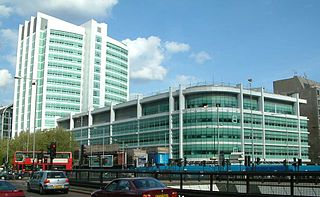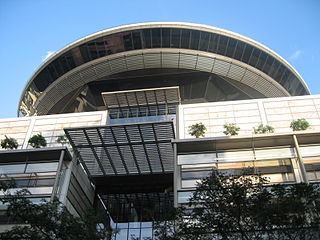
In common law jurisdictions, a misrepresentation is an untrue or misleading statement of fact made during negotiations by one party to another, the statement then inducing that other party to enter into a contract. The misled party may normally rescind the contract, and sometimes may be awarded damages as well.

The doctrine of legitimate expectation was first developed in English law as a ground of judicial review in administrative law to protect a procedural or substantive interest when a public authority rescinds from a representation made to a person. It is based on the principles of natural justice and fairness, and seeks to prevent authorities from abusing power.

Child protection is the safeguarding of children from violence, exploitation, abuse, and neglect. Article 19 of the UN Convention on the Rights of the Child provides for the protection of children in and out of the home. One of the ways to ensure this is by giving them quality education, the fourth of the United Nations Sustainable Development Goals, in addition to other child protection systems.
Judicial review is a part of UK constitutional law that enables people to challenge the exercise of power, often by a public body. A person who feels that an exercise of power is unlawful may apply to the Administrative Court for a court to decide whether a decision followed the law. If the court finds the decision unlawful it may have it set aside (quashed) and possibly award damages. A court may impose an injunction upon the public body.

English contract law is the body of law that regulates legally binding agreements in England and Wales. With its roots in the lex mercatoria and the activism of the judiciary during the industrial revolution, it shares a heritage with countries across the Commonwealth, from membership in the European Union, continuing membership in Unidroit, and to a lesser extent the United States. Any agreement that is enforceable in court is a contract. A contract is a voluntary obligation, contrasting to the duty to not violate others rights in tort or unjust enrichment. English law places a high value on ensuring people have truly consented to the deals that bind them in court, so long as they comply with statutory and human rights.
Re Saul D Harrison & Sons plc [1995] 1 BCLC 14, [1994] BCC 475, is a UK company law case on an action for unfair prejudice under s.459 Companies Act 1985. It was decided in the Court of Appeal and deals with the concept of members of a business having their "legitimate expectations" disappointed. Vinelott J at first instance had denied the petition, and the Hoffmann LJ, Neill LJ and Waite LJ in the Court of Appeal upheld the judgment.

United Kingdom administrative law is part of UK constitutional law that is designed through judicial review to hold executive power and public bodies accountable under the law. A person can apply to the High Court to challenge a public body's decision if they have a "sufficient interest", within three months of the grounds of the cause of action becoming known. By contrast, claims against public bodies in tort or contract are usually limited by the Limitation Act 1980 to a period of 6 years. Almost any public body, or private bodies exercising public functions, can be the target of judicial review, including a government department, a local council, any Minister, the Prime Minister, or any other body that is created by law. The only public body whose decisions cannot be reviewed is Parliament, when it passes an Act. Otherwise, a claimant can argue that a public body's decision was unlawful in five main types of case: (1) it exceeded the lawful power of the body, used its power for an improper purpose, or acted unreasonably, (2) it violated a legitimate expectation, (3) failed to exercise relevant and independent judgement, (4) exhibited bias or a conflict of interest, or failed to give a fair hearing, and (5) violated a human right. As a remedy, a claimant can ask for the public body's decisions to be declared void and quashed, or it could ask for an order to make the body do something, or prevent the body from acting unlawfully. A court may also declare the parties' rights and duties, give an injunction, or compensation could also be payable in tort or contract.

The United Kingdom constitutional law concerns the governance of the United Kingdom of Great Britain and Northern Ireland. With the oldest continuous political system on Earth, the British constitution is not contained in a single code but principles have emerged over the centuries from statute, case law, political conventions and social consensus. In 1215, Magna Carta required the King to call "common counsel" or Parliament, hold courts in a fixed place, guarantee fair trials, guarantee free movement of people, and free the church from the state; it also enshrined the rights of "common" people to use the land. After the English Civil War and the Glorious Revolution 1688, Parliament won supremacy over the monarch, as well as the church and the courts, and the Bill of Rights 1689 recorded that the "election of members of Parliament ought to be free". The Act of Union 1707 unified England, Wales and Scotland, while Ireland was joined in 1800, but the Republic of Ireland formally separated between 1916 and 1921 through bitter armed conflict. By the Representation of the People Act 1928, almost every adult man and woman was finally entitled to vote for Parliament. The UK was a founding member of the International Labour Organization (ILO), the United Nations, the Commonwealth, the Council of Europe, and the World Trade Organization (WTO). The principles of parliamentary sovereignty, the rule of law, democracy and internationalism guide the UK's modern political system.

United Kingdom enterprise law concerns the ownership and regulation of organisations producing goods and services in the UK, European and international economy. Private enterprises are usually incorporated under the Companies Act 2006, regulated by company law, competition law, and insolvency law, while almost one third of the workforce and half of the UK economy is in enterprises subject to special regulation. Enterprise law mediates the rights and duties of investors, workers, consumers and the public to ensure efficient production, and deliver services that UK and international law sees as universal human rights. Labour, company, competition and insolvency law create general rights for stakeholders, and set a basic framework for enterprise governance, but rules of governance, competition and insolvency are altered in specific enterprises to uphold the public interest, as well as civil and social rights. Universities and schools have traditionally been publicly established, and socially regulated, to ensure universal education. The National Health Service was set up in 1946 to provide everyone with free health care, regardless of class or income, paid for by progressive taxation. The UK government controls monetary policy and regulates private banking through the publicly owned Bank of England, to complement its fiscal policy. Taxation and spending composes nearly half of total economic activity, but this has diminished since 1979.

Esso Petroleum Co Ltd v Mardon [1976] EWCA Civ 4 is an English contract law case, concerning misrepresentation. It holds that the divide between a statement of opinion and fact becomes more factual if one holds himself out as having expert knowledge.

The doctrine of legitimate expectation in Singapore protects both procedural and substantive rights. In administrative law, a legitimate expectation generally arises when there has been a representation of a certain outcome by the public authorities to an individual. To derogate from the representation may amount to an abuse of power or unfairness. The doctrine of legitimate expectation as a ground to quash decisions of public authorities has been firmly established by the English courts. Thus, where a public authority has made a representation to an individual who would be affected by a decision by the authority, the individual has a legitimate expectation to have his or her views heard before the decision is taken. Alternatively, an individual may also have a legitimate expectation to a substantive right. The recognition of substantive legitimate expectations is somewhat controversial as it requires a balancing of the requirements of fairness against the reasons for any change in the authority's policy. This suggests the adoption of a free-standing proportionality approach, which has been said not to apply in administrative law.

R v Secretary of State for Foreign and Commonwealth Affairs, ex parte Bancoult [2008] UKHL 61 is a UK constitutional law case in the House of Lords concerning the removal of the Chagos Islanders and the exercise of the Royal Prerogative. The Chagos Islands, acquired by the United Kingdom in 1814, were reorganised as the British Indian Ocean Territory (BIOT) in 1965 for the purpose of removing its inhabitants. Under a 1971 Order in Council, the Chagossians were forcibly removed, and the central island of Diego Garcia leased to the United States for use as a military outpost.

Administrative law in Singapore is a branch of public law that is concerned with the control of governmental powers as exercised through its various administrative agencies. Administrative law requires administrators – ministers, civil servants and public authorities – to act fairly, reasonably and in accordance with the law. Singapore administrative law is largely based on English administrative law, which the nation inherited at independence in 1965.

Illegality is one of the three broad headings of judicial review of administrative action in Singapore, the others being irrationality and procedural impropriety. To avoid acting illegally, an administrative body or public authority must correctly understand the law regulating its power to act and to make decisions, and give effect to it.

Johnstone v Bloomsbury Health Authority [1992] QB 333 is an English contract law case, concerning implied terms and unfair terms under the Unfair Contract Terms Act 1977.

Gisda Cyf v Barratt [2010] UKSC 41 is a UK labour law case, concerning unfair dismissal governed by the Employment Rights Act 1996.

Procedural impropriety in Singapore administrative law is one of the three broad categories of judicial review, the other two being illegality and irrationality. A public authority commits procedural impropriety if it fails to properly observe either statutory procedural requirements, or common law rules of natural justice and fairness.

R. v. North and East Devon Health Authority, ex parte Coughlan is a seminal case decided by the Court of Appeal of England and Wales in 1999 which clarified the court's role in relation to cases which involve substantive legitimate expectations. The Court held that when reviewing a decision of a public authority which is contrary to a prior assurance or representation by the authority, its role is not always limited to assessing if the decision is Wednesbury unreasonable or irrational. In some situations, it is entitled to determine whether it is fair to compel the authority to fulfil its representation, or whether there is a sufficient overriding public interest which justifies allowing the authority to depart from the promise made.
The English national framework for NHS continuing healthcare came into force on 1 October 2007 as a development in the light of the case of Coughlan which established that where a person's need is primarily for health care then the health service must fund the whole cost of nursing home placement. People who qualify are entitled to care paid for by the NHS, for which they do not have to pay, rather than social care, which is means-tested. Most of those who qualify need nursing home care. It is in the interests of local social services departments to establish entitlement to continuing healthcare as this relieves them of any financial responsibility. This system has existed in one form or another since the creation of the NHS.

Huang v Secretary of State for the Home Department [2007] UKHL 11 is a UK constitutional law case, concerning judicial review.














